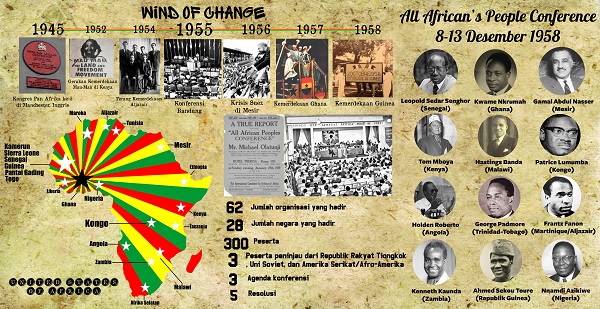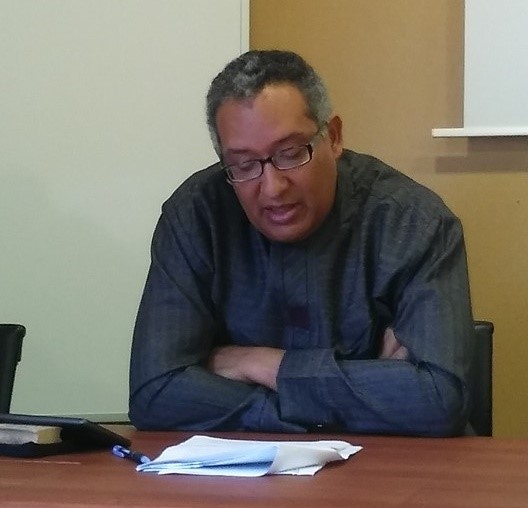Happy anti-racist African Liberation Day 2017!

It is important to understand the political significance of this Day. It is not just a Day to celebrate our African pride but also a date to remember the freedom fighters of the continent and to keep in mind all the battles still to be fought for the definitive liberation from neocolonialism. It is a Day to denounce all foreign interference in Africa.
African Liberation Day is celebrated on 25 May of each year. The origin of the event is at the First Conference of Independent African States held in Ghana on 15 May 1958. It was the first Pan-African conference held in the African Continent and in a newly independent nation.
The first President of Ghana Dr Kwame Nkrumah gathered in Accra the leaders of the then eight independent African nations: Egypt, Ethiopia, Ghana, Liberia, Libya, Morocco, Sudan and Tunisia. Representatives of the liberation movements of Cameroon, Algeria and other territories still under European colonial occupation also participated. The conference was instituted on May 15 as Africa Freedom Day to symbolise the determination of the African people towards freedom from colonial exploitation.

Session of the All-African Peoples Conference in Accra, Ghana 1958. Photo: Wikimedia.
This conference was followed by the All African Peoples Conferences of December 1958, January 1960 and March 1961 which advanced the agenda of the struggle against colonialist oppression. Subsequently, in 1963, after the founding of the Organisation of African Unity in Ethiopia by 32 newly freed African states, the day was renamed African Liberation Day. Today it is also known as The Africa Day.

Kwame Nkrumah and his Family with Egyptian President Gamal Abdel Nasser at the 1965 OAU Summit. Photo: Wikimedia.
It is important to understand the political significance of the Africa Day. It is not just a day to celebrate our African pride and culturally express ourselves but also a date to remember the freedom fighters of the continent and to keep in mind all the battles still to be fought for the definitive liberation from neocolonialism. It is also a day to denounce all foreign interference operations that continue to occur: Libya, Ivory Coast, Somalia…
At present, there are many movements and organisations that celebrate the anniversary. For those of us who understand that Africa and its diasporas are still in struggle until full liberation, this will always be the African Liberation Day; and generally for those people and organizations who do not know the political meaning of the day or prefer to highlight the cultural pride aspect of the celebration, today is the Africa Day. In any case, it is very important to understand that the day was born as a way of merging all the liberation struggles of the whole continent, of all African peoples in all corners of Africa. It can not, therefore, be claimed by only one of these peoples, as some movements claim, particularly in the United States, even if it is undoubtedly the largest majority in Africa and the most oppressed, exploited and massacred people in the world.

Omowale Malcolm X, El-Hajj Malik El-Shabazz, Mecca, 1964. Photo: profoundbandit.tumblr.com
The Afro-American perspective has been very useful in providing content for black liberation, but it is also true that African-American leaders must raise from the oppressive environment of American racism in order to see the struggle, in all its dimensions with greater realism and a broader view. That was the case of Omowale Malcolm X who came into contact with the African and Arab realities after his abandonment of the Nation of Islam (NOI) and greatly expanded his vision of the problem of white supremacism and Arab supremacism, which also exists. If we stick with a single part of his thinking, we will not understand what racist oppression has been in the world and how are we going to to get out of it.
The intellectual basis of the Pan-Africanist movement is antiracist since racism is a Western and Arab invention used for the oppression of the enslaved and colonised. There should not be any confusion about it. Every African in Africa and the Diaspora, and every sincere friend of Africa, whether or not African, regardless of origin, as long as they have the Africa and its Diaspora liberation and unity as primary objectives, is welcome to our fight. Pan-Africanism must not be confused with movements which, by defending something that is legitimate, recall to essentialist thoughts illegitimate for any human being. This essentialism undoubtedly will drive out of the movement those more ethically aware of the need to be consistent with our own thinking and thus will distance us from the goal of unification and empowerment of the African Continent. The All-African Peoples Conference was never the Most-African Peoples Conference or the Some-African Peoples Conference.

African liberation is an inspiration to many peoples of the world. This infographic is in Indonesian. Source: http://sahabatmkaa.com/
To demand the emancipation and independence of thought and action for black people is not racism but legitimate resistance, since the worst of historical oppression has been suffered by racialized black people. In the same way, one must demand respect for the diversity of colours, origins and cultures present in Africa because the contrary means assuming the fallacious categories of the oppressor. This is the spirit of the creators of Pan-Africanism, particularly Du Bois and Nkrumah, a Pan-Africanism that fights against all forms of oppression, including racism.
This thought which fights both for the physical and mental liberation of the black person as well as for that of the rest of Africans should not be contaminated by irrational thinking. African liberation is and should be the inspiration for all anti-imperialist struggles. For a true social liberation to happen, we must first liberate us from the mental bonds of the categories imposed by the slaveholders, colonialists, neo-colonialists and racists, and therefore, as Pan-Africanists, we must demand a scrupulous respect for the African people in Africa And outside it, in all its diversity.
Siku ya Ukombozi was Afrika!
¡Feliz Día de la Liberación Africana!
Happy African Liberation Day!

* Antumi Toasijé is a historian and Africologist. He is Director of the Pan African Studies Center (Spain) www.centropanafricano.com.
* THE VIEWS OF THE ABOVE ARTICLE ARE THOSE OF THE AUTHOR AND DO NOT NECESSARILY REFLECT THE VIEWS OF THE PAMBAZUKA NEWS EDITORIAL TEAM
* BROUGHT TO YOU BY PAMBAZUKA NEWS
* Please do not take Pambazuka for granted! Become a Friend of Pambazuka and make a donation NOW to help keep Pambazuka FREE and INDEPENDENT!
* Please send comments to [email=[email protected]]editor[at]pambazuka[dot]org[/email] or comment online at Pambazuka News.
